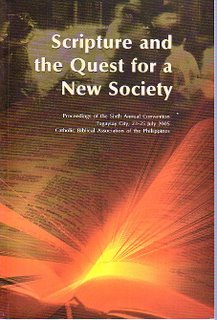 Surfing the internet sometimes seems like scavenging in a garbage can where people throw all sorts of ideas and opinions. One can find in the cyber bin valuable insights that can be put to good use – but only after painstakingly sorting out the ‘recyclable’ from the ‘rubbish,’ and throwing away piles and piles of trash.
Surfing the internet sometimes seems like scavenging in a garbage can where people throw all sorts of ideas and opinions. One can find in the cyber bin valuable insights that can be put to good use – but only after painstakingly sorting out the ‘recyclable’ from the ‘rubbish,’ and throwing away piles and piles of trash. Searching for “bible politics” at Google yields web articles like these:
* Politics and Bible don’t mix
* Separation of church and state, God versus politics in
* End-time Ministries – Revealing the future through Bible prophecy
* GOP: ‘Liberals’ will ban the bible
* The Bible as Bush’s guidebook
* Why the Cross can do what politics can’t
* The Bible teaches peace: Ancient Israel’s power politics
The 6th Annual Convention of the Catholic Biblical Association of the
The workshop papers of Anthony Ceresko (“Endings and Beginnings: ‘Alphabetic Thinking’ and the Shape of Psalms 106 and the Psalter”); Randy Flores (“‘. . . ’ (NAB) Elihu’s Critique of Power and Wealth: An Exegesis of Job 36:16-21”); Helen Graham (“A God Who Crushes Wars: Reading the Book of Judith as an Anti-War Document”); and Herb Schneider (“Women in Early Christianity and the Institutionalization of Charisma”) also discussed how the Bible deals with various social and political issues.
Instead of being purely academic, the lectures and discussions drew from the Bible practical lessons on politics and governance. They also inspired and called people to action. As it turned out the CBAP convention produced several excellent papers that are grounded on solid scholarship and balanced views of the authors. The precious insights they present can be a firm rock on which people—faced with unsettling waves of divergent ideas and opinions in the internet as well as in other popular media—can anchor their values and convictions
The main lectures and the worshop papers has recently been published in Scripture and the Question for a New Society (Manila: CBAP, 2006) 156 pp.
No comments:
Post a Comment